Justice
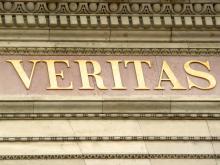
IF YOU WANT to understand why the climate movement missed Tim DeChristopher when he was in jail for two years, you should read the letter he sent recently to the president of Harvard.
Drew Faust—Harvard’s first female president—had just spoken for the establishment (really, the establishment establishment) by publishing a weary, soulless letter explaining that Harvard would not divest from fossil fuels despite the request of 80 percent of its student body. DeChristopher—who was imprisoned for two years after an inspired act of civil disobedience to block a drilling lease auction in his home state of Utah—had just arrived in Cambridge to start at Harvard Divinity School.
“Drew Faust seeks a position of neutrality in a struggle where the powerful only ask that people like her remain neutral,” DeChristopher wrote. “She says that Harvard’s endowment shouldn’t take a political position, and yet it invests in an industry that spends countless millions on corrupting our political system. In a world of corporate personhood, if she doesn’t want that money to be political, she should put it under her mattress. She has clearly forgotten the words of Paolo Freire: ‘Washing one’s hands of the conflict between the powerful and powerless means to side with the powerful, not to remain neutral.’ Or as Howard Zinn put [it] succinctly, ‘You can’t be neutral on a moving train.’”
DeChristopher is exactly right. Just as a tie goes to the runner, so “neutrality” goes to the status quo. And given that we’re in a full-on climate emergency—the Arctic melted last summer, for crying out loud—this kind of neutrality is no more admirable than defending the right of poor and rich alike to sleep beneath bridges.
IN THE FOREWORD to Where Justice and Mercy Meet: Catholic Opposition to the Death Penalty, Sister Helen Prejean writes, “Welcome to the pages of this amazing book.” Her hospitable remark is not an exaggeration. I have written articles, taught classes, and spoken to church groups about capital punishment; in my judgment this book is the most accessible resource now available for engaging, informing, and perhaps even transforming how readers view the death penalty.
Where Justice and Mercy Meet was edited by death penalty activist Vicki Schieber, philosopher Trudy D. Conway, and theologian David Matzko McCarthy. The book is the product of two years of interdisciplinary courses, discussions, projects, and research—in sociology, political science, philosophy, economics, theater, ethics, and theology—at Mount Saint Mary’s University in Emmitsburg, Md. While the book has a Catholic focus, it should be useful to Christians of all stripes and others interested in addressing this issue.
The volume is divided into four parts. Through skillful section and chapter introductions and segues, the editors have done a fine job of creating an integrated whole. Relevant questions for discussion and action tips make the book perfect for study groups in churches and for the university classroom.
Part I, “The Death Penalty Today,” exposes the realities of the dominant current method of execution (lethal injection), surveys the history of the death penalty debate in the U.S., and suggests the significance of reading or hearing the stories of those affected by murder and capital punishment. Kurt Blaugher’s chapter, “Stirring Hearts and Minds,” meditates on the role of drama in allowing these stories to capture and broaden our imagination, to stimulate reflection, and to compel us to take action for social change. Indeed, stories—from real life as well as from film and literature—surface throughout the volume, with the most moving and memorable ones being the experiences and voices of those whose loved ones were murdered.

THIS STORY IS about the loss of a war and the sin and insanity of continuing to wage that war with the same weapon: prisons. From the well-meaning but naive “solution” of “just say no” to the equally well-meaning but equally naive mandatory minimum sentences, we have been defeated in our War on Drugs.
When we finally realized that we had lost the undeclared war in Vietnam, those remaining in Saigon climbed to the highest building and clung to the last helicopter leaving the country. Now it is time for the metaphor to be exercised in the drug war. We have lost.
Cleats and Dignity
The civil rights struggle for African Americans happened in every sphere of life. Breaking the Line: The Season in Black College Football That Transformed the Sport and Changed the Course of Civil Rights, by Samuel G. Freedman, tells of two great black coaches in the tense year of 1967. Simon & Schuster
Catching Fire
One project of the USC Center for Religion and Civic Culture is the Pentecostal and Charismatic Research Initiative, which funded research in more than 20 countries. PCRI resources include the informative recent report, “Moved by the Spirit: Pentecostal and Charismatic Christianity in the Global South.” crcc.usc.edu/pcri
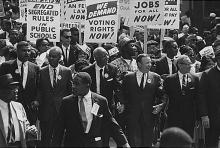
I will march on Saturday because I refuse to allow my two sons to be treated as statistics or a stereotypes rather than as children of God. I will march because overly aggressive policing tactics that overly rely upon racial profiling make a mockery of Dr. King’s dream that every child will be judged by the content of their character and not the color of their skin.
I will march because the recent repeal of section four of the Voting Rights Act by the Supreme Court jeopardizes the voting rights of millions of Americans across the country, particularly in southern states where new barriers to this sacred right are already being erected.
I will march because based on national statistics, my two black boys face a one in three chance of spending some time of their lives behind bars, a disturbing and destructive reality that has been made possible in part by mandatory drug sentencing laws that must be reevaluated and changed.
CYNTHIA MOE-LOBEDA is a Lutheran feminist ethicist trained at Union Theological Seminary in New York who teaches Christian ethics, gender, and diversity studies at Seattle University. The author of several previous books in Christian social ethics, she has emerged as a significant voice in contemporary Christian economic, ecological, and public ethics.
The evil considered in Resisting Structural Evil is primarily the collective ecological and economic damage being done by wealthy global North folk—such as most readers of this review—through the indulgent and wasteful way of life that we have been socialized into accepting as normal despite its disastrous implications and effects. This evil is structural and driven largely by the unaccountable and nearly unlimited power of the modern corporation.
One reason our ecological and economic injustice can be labeled as evil is because it is largely hidden from our eyes—or if we see it, it is accepted as simply the way things are and always have been and always will be. So we live off the suffering of the people whose land we take or despoil, or whose livelihoods we destroy, or whose water we poison, or whose labor we exploit to get our “everyday low prices.” And we go merrily about our wealthy and comfortable way in a state of what the author describes as “moral oblivion.”
Moe-Lobeda takes the reader on a journey intended to end such moral oblivion. I find the book to be primarily an exposé of the connections between the “American way of life” and the injustices on which it is built—and which it perpetuates. Among these injustices is harm to the earth, which has both terrifying long-term implications for the livability of our planet in the future and concrete short-term costs for those invisible neighbors of ours who suffer ecological harm so that we might drink our soft drinks and get the latest electronics.

Oddly, I wasn't there the night George Zimmerman shot Trayvon Martin. I wasn't in the jury box either. Some commentators, like Ezra Klein and Ta-Nahesi Coates, are saying the not guilty verdict was appropriate according to Florida's "stand your ground" law. (Note that they are not saying that the Florida law is appropriate; Klein uses the word outrageous).
If this verdict was appropriate, though, what about verdicts in cases that were similar except for the color of the defendant? What happened to the "stand your ground" law when the jury reached its verdict against Marissa Alexander — an African American woman from Jacksonville, Fla.?
And anyway, why should fear of attack justify shooting to kill? It didn't in the case of John White — an African American man from Long Island, N.Y. — who shot a (white) teenager in 2006 (accidentally, he says, when the boy was trying to grab his gun).
John White, it appears, had good reason to fear the boys who showed up on his doorstep that night. That's probably why the governor commuted his sentence after he had served five months. And White no doubt should have served some time, according to New York law — his gun was unregistered, and if he hadn't been holding it when he went to the door, a scuffle probably wouldn't have escalated into manslaughter.
But, some say, the only thing that stops a bad guy with a gun is a good guy with a gun. Is this true?

At first I had no problem with domestic drones joining the plethora of surveillance cameras to “keep us safe.”
Big Brother — keeping his eye on me from above in stores, in traffic and everywhere else — would find my personal reality show boring. As a pastor, I’m used to living in a fishbowl. Besides, as John Calvin said, if you fear the eye of a human more than the eye of God, you have spiritual issues to address.
But then, there may be another problem with increased surveillance and flooding our nation’s skies with drones. Let’s take traffic cameras as an example.
LIBERTY UNIVERSITY in Lynchburg, Va., was founded by televangelist Jerry Falwell. Its publications carry the slogan “Training Champions for Christ since 1971.” Some of those champions are now being trained to pilot armed drones, and others to pilot more traditional aircraft, in U.S. wars. For Christ.
Liberty bills itself as “one of America’s top military-friendly schools.” It trains chaplains for the various branches of the military. And it trains pilots in its School of Aeronautics (SOA)—pilots who go up in planes and drone pilots who sit behind desks wearing pilot suits. The SOA, with more than 600 students, is not seen on campus, as it has recently moved to a building adjacent to Lynchburg Regional Airport.
Liberty’s campus looks new and attractive, large enough for some 12,000 students, swarming with blue campus buses, and heavy on sports facilities for the Liberty Flames. A campus bookstore prominently displays Resilient Warriors, a book by Associate Vice President for Military Outreach Maj. Gen. (Ret.) Robert F. Dees. There’s new construction everywhere you look: a $50 million library, a baseball stadium, new dorms, a tiny year-round artificial ski slope on the top of a hill. In fact, Liberty is sitting on more than $1 billion in net assets.
The major source of Liberty’s money is online education. There are some 60,000 Liberty students you don’t see on campus, because they study via the internet. They also make Liberty the largest university in Virginia, the fourth largest online university anywhere, and the largest Christian university in the world.

EVERY TIME I fly into Ontario, Calif., I see neat blocks of gleaming, low-rise warehouses surrounded by well-manicured trees and shrubbery. I now know that what goes on inside those buildings is not nearly so pretty.
As a board member of People of Faith United for Worker Justice, a local faith-rooted worker justice organization, I have seen the dismal working conditions inside several of these warehouses and have heard the testimonies of workers who have been seriously injured on the job. Eighty-five percent of the warehouse workers in Southern California earn minimum wage and receive no health benefits, even though their jobs entail unloading and reloading heavy boxes.
Since many of these workers are hired through temp agencies, which are often located inside the warehouses, workers’ rights are routinely abused. When someone is injured, instead of being cared for, he or she is simply not called back to work the next day. When workers complain about poor working conditions—such as a lack of breaks, access to bathrooms, or having to lift heavy boxes into freight trucks in 108-degree temperatures—the managers tell them it’s not their responsibility because the workers are employed by the temp agency. The temp agencies in turn claim they are not responsible for conditions in the warehouses because the agencies are separate companies.
REV. SUSAN QUINN BRYAN walked into a meeting of the Friends of the Anna Louise Inn fully prepared for a room brimming with people. Instead, Bryan and the five other Presbyterian pastors she had brought with her doubled the meeting’s total attendance. Bryan was stupefied.
When she moved to Cincinnati in 2005 to pastor Mount Auburn Presbyterian Church, several of her congregants had taken her to the Anna Louise Inn, claiming it as one of the things they loved most about the city. And yet, in its time of need, hardly anyone had come to the Inn’s rescue. It would take several minutes before an even more startling realization came to Bryan.
“As [people] began talking, I thought, ‘Where’s the church? How can the church stand silent while this is happening?’” she said. “So I organized a breakfast and just sent out emails to all the clergy I could find.”
About 25 Cincinnati faith leaders came to Bryan’s breakfast, and out of it emerged an ecumenical force, crossing denominational divides to rally behind one of Cincinnati’s most revered institutions.
THE BATTLE FOR the Anna Louise Inn began in 2007 after Cincinnati Union Bethel (CUB), the social service agency that operates the Inn, decided the Inn needed updated facilities.
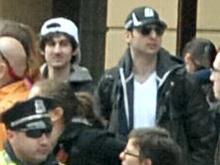
When I got off the plane at O’Hare Airport in Chicago on my way home to Boston on April 15, I couldn’t believe my eyes. Televisions blaring everywhere showed my beloved city at her premier event of the year, the Boston Marathon. Everyone knows the rest of the story.
“Is this for real? How can this be?” I asked, unable at first to face the reality of what had occurred. Feelings of fear and anger followed quickly on the heels of the denial.
Leaders responded quickly: the mayor, the governor, the president. “Any responsible individuals, any responsible groups will feel the full weight of justice,” promised President Barack Obama.
What is justice? Vengeful words immediately spewed from talk shows and bloggers’ keyboards. “We must catch them alive and make them suffer as much as possible. That will pay them back for what they did,” spewed those who equate justice with revenge.
Of course, violence begets more violence. Gandhi put it succinctly: “An eye for an eye makes the whole world blind.” Paul exhorted the Romans, “Repay no one evil for evil, but take thought for what is noble in the sight of all. . . Beloved, never avenge yourselves, but leave it to God, for it is written, ‘Vengeance is mine, I will repay,’ says the Lord. (Romans 12:17,19.)”
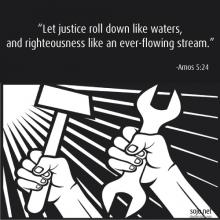
Editor's Note: The following is the text of an invocation being given at the May Day Rally in Madison, Wis.
When we gather at a place like our State Capitol, there are people here from all sorts of religious and non-religious backgrounds.
There are Christians and Jews, Muslims and Buddhists, Hindus and and Bahai, Humanists and people who are pretty sure they believe something, but don’t know exactly how the heck to describe it.
What connects us all this day is a spirit of hospitality, a spirit of compassion and a spirit of justice.
At their worst, religious and other beliefs can isolate us in little camps where we see outsiders as threats. At their best, they call us to hospitality, not only to those we know, but to the strangers in our midst – those who come from other places, speak other languages, seek a new life. At their best, they call us to embrace those who seek to be part of our community.

I woke up this morning, like everyone else, to the news of a shootout with one suspect in the Boston Marathon bombing and the ongoing manhunt for a second brother. Like many others, I’ve heard lots of misinformation over the past few days about whether officials did or didn’t have a suspect, whether they did or didn’t have them in custody, and so on.
“I heard someone dropped a bomb on Boston,” said Mattias, my 9-year-old son, over breakfast while I scrolled through the breaking news reports.
“Not exactly,” I said. “It was two guys. Two brothers who came from [another country] to go to college at MIT.” They put homemade bombs in and around trashcans by the finish line of the marathon.”
“Why?” he asked.
“I really don’t know.”
“Maybe they were angry about something, and they didn’t know how to talk about their feelings.”
“Maybe so,” I nodded.
“Did they hurt people?”

The Boston Marathon bombing is so shocking because it was obviously done by someone(s) who wanted to prove something not to themselves, but to others. Could they display to the world his repressed rage enough? Could they divert attention to their cause enough? Could they maim and kill the innocent for some misguided agenda enough? That is what makes this act of terrorism so terrifying: a sick person or people trying to prove something to others by targeting those who are simply proving something to themselves, or trying to do something for others. It is jarring.
Ninety minutes before the bombs detonated, I was concluding a presentation on Jesus’ parable of the Good Samaritan. That recent immersion into Luke’s narrative shaped my video viewing of the bombing’s aftermath. The one who “fell into the hands of robbers” was everywhere. The assaulted and bloodied were scattered by the side of the road, in this case, Boylston Street. Instead of people passing by on the other side, however, it was quite the opposite. Spectators and emergency medical personnel waded into the grisly scene and treated the wounded with exquisite care.
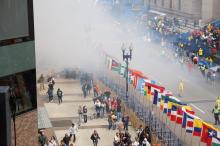
What do you say in the face of evil?
The stories from Monday’s attacks at the Boston Marathon are heartbreaking, gut-wrenching. One in particular stands out to me. A woman was waiting for her husband to cross the finish line when the bombs exploded. For three hours she searched frantically for him, not knowing if he was alive or dead, not knowing if he was frantic and looking for her. Her voice cracked and tears flowed with the raw memory as she told of the moment when she and her husband embraced.
Moments like this, even when they end happily, remind us of our vulnerability. As hard as we try to protect ourselves with heightened security measures, we know that complete invulnerability is impossible. I am vulnerable. My wife is vulnerable. My children are vulnerable. We cannot escape it.
In the face of gun violence and bombings, gender violence and rape, we would be irresponsible not to ask big questions about evil and human vulnerability.
A few hours after the bombing, President Barack Obama addressed our natural desire to carry out justice after these events.
[M]ake no mistake; we will get to the bottom of this. We will find out who did this, we will find out why they did this. Any responsible individuals, any responsible groups, will feel the full weight of justice.
Like the president, I want to take action against evil and I want to know I am secure. I hate admitting that I’m vulnerable. But the president’s words didn’t reassure me. They made me feel more vulnerable because the phrase “full weight of justice” is always a veiled call to violence.
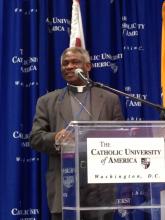
On April 11, 1963 Pope John XXIII published an encyclical some initially dismissed as naive and myopic, as too liberal and too lofty. But today, his "Pacem in Terris" is generally lauded as genius and prophetic – well ahead of its time on the issues of human rights, peace, and equality.
As Maryann Cusimano Love, a Catholic professor of international relations, notes, the same year “Pacem in Terris” was published, spelling out the theological mandate for political and social equality for all people, women in Spain were not allowed to open bank accounts, Nelson Mandela was standing trial for fighting apartheid, and Walter Ciszek was serving time in a Soviet gulag simply for being Catholic.
On Monday and Tuesday, the Catholic Peacebuilding Network hosted a two-day conference at the Catholic University of America, commemorating 50 years since the publication of "Pacem in Terris.”
- Preaching God's Transforming Justice, edited by Dale P. Andrews, Dawn Ottoni-Wilhelm, and Ronald J. Allen, is a lectionary commentary series from Westminster John Knox Press that helps preachers better proclaim the biblical call to be agents of God's love and justice in the world. Embodying that mission in a small but key way, the 90 contributors include close to equal numbers of women and men and represent significant ethnic and racial diversity. Each volume provides commentary for all the year's lectionary days, plus essays on 22 "Holy Days of Justice," from World AIDS Day to Children's Sabbaths. The first two volumes, for Years B and C, are already available. The Year A volume is due for release in August.
- The Revised Common Lectionary's readings for each Sunday—four selected scriptures, generally one each from the Psalms, the rest of the Hebrew Bible, the epistles, and the gospels—are heard by millions of Christians each week. Timothy Matthew Slemmons, an assistant professor of homiletics and worship at the University of Dubuque Theological Seminary, has been captivated by what isn't heard. In Year D: A Quadrennial Supplement to the Revised Common Lectionary (Cascade Books), he argues for an expansion of the lectionary in order to present a fuller portrait of God's revelation. It includes a proposed one-year set of readings that does not shy away from many difficult texts, including from the Psalms and prophets.
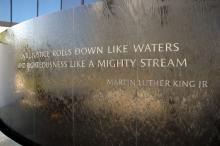
In January 2011, members of Christian Churches Together in the U.S.A. met in Birmingham, Ala., to examine issues of domestic poverty and racism through the lens of the civil rights movement and by reading together Martin Luther King Jr.'s "Letter from Birmingham Jail." As they gathered in the 16th Street Baptist Church under the beautiful Wales Window portraying the black Christ, which replaced the window blown out when the church was bombed in 1963, these contemporary church leaders, representing the broadest Christian fellowship in the country—36 national communions and seven national organizations, including Sojourners—realized that apparently no clergy had ever issued a response to King's famous letter, even though it was specifically addressed to "fellow clergymen [sic]." In 2013, to mark the 50th anniversary of King's letter, Christian Churches Together released its thoughtful response, which we excerpt below. —The Editors
WE CONFESS. As leaders of churches claimed by more than 100 million Americans; as Catholics, evangelicals, Pentecostals, Orthodox, Historic Protestants, and members of Historic Black denominations; as people of many races and cultures: We call ourselves, our institutions, and our members to repentance. We make this confession before God and offer it to all who have endured racism and injustice both within the church and in society.
As church leaders, we confess we have tended to emphasize our responsibility to obey the law while neglecting our equal moral obligation to change laws that are unjust in their substance or application. All too often, the political involvement of Christians has been guided by the pursuit of personal or group advantage rather than a biblically grounded moral compass. We confess it is too easy for those of us who are privileged to counsel others simply to "wait"—or to pass judgment that they deserve no better than what they already have.
We confess that we are slow to listen and give legitimacy to those whose experience of race relations and social privilege in America is different than our own. We keep the "other" at arm's length to avoid hearing the call to sacrifice on their behalf. Our reluctance to embrace our "inescapable network of mutuality" underscores Dr. King's observation that privileged groups seldom give up their advantages voluntarily. For example, it is difficult to persuade most suburban Christians to demand that they strive for the same quality of education in our cities that they take for granted in their own schools. To the extent that we do not listen in love, our influence in society is limited to "a weak, ineffectual voice with an uncertain sound."
AT TIMES IT SEEMS VERY HARD to realize that half a century has passed since my late wife, Rosemarie, and I were in Birmingham, Ala., living out a part of our years of service as representatives of the Mennonite churches of America to the Southern freedom movement—that historic black-led struggle for the expansion of democracy in America (inadequately labeled "the civil rights movement").
It was in the midst of those powerful days, in the late winter and early springtime of 1963, when our extraordinary people's movement was spreading to dozens of communities across the South, with some important reverberations in the North, and across the world as well. Usually initiated by courageous home-grown black leaders such as Rev. Fred Shuttlesworth of Birmingham and Victoria Gray of Palmers Crossing, Miss., the determined local groups often called upon national or South-wide organizations to help them in their campaigns.
Late in 1961, Shuttlesworth, who was part of the King-led Southern Christian Leadership Conference (SCLC), asked Martin Luther King Jr. and SCLC to come help the Birmingham movement. It faced a level of continuing white terrorism that led the black community to call their city "Bombingham," referring, of course, to the deadly violence they encountered whenever they attempted to challenge the white segregationist powers who were determined to keep black people in a submissive, separate, and dominated role.
When King and SCLC decided to respond to Shuttlesworth and move onto the Birmingham scene, Rosemarie and I were already friends and co-workers with Martin and Coretta, and King asked us to come participate in the struggle for the transformation of Birmingham. So we were present and in the line of marchers when King, his co-worker Ralph Abernathy, and others were arrested in early April 1963.